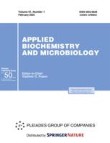|
Αρχειοθήκη ιστολογίου
-
►
2023
(256)
- ► Φεβρουαρίου (140)
- ► Ιανουαρίου (116)
-
►
2022
(1695)
- ► Δεκεμβρίου (78)
- ► Σεπτεμβρίου (142)
- ► Φεβρουαρίου (155)
-
►
2021
(5507)
- ► Δεκεμβρίου (139)
- ► Σεπτεμβρίου (333)
- ► Φεβρουαρίου (628)
-
▼
2020
(1810)
-
▼
Δεκεμβρίου
(544)
-
▼
Δεκ 01
(33)
- Use of an Alternative Pathway for Isoleucine Synth...
- Assessment of the Biotechnological Potential of Cy...
- New Recombinant Phytase from Kosakonia sacchari : ...
- Obtainment and Characteristics of Phytoecdysteroid...
- Effect of Virus-Inactivating Agents on the Immunog...
- Prospects for the Use of Methylotrophic Yeast in t...
- Efficiency of Microbial Preparations Based on Baci...
- Glutamyl- and Glutaminyl-tRNA Synthetases Are a Pr...
- Bioaugmentation of Nitrifying Microorganisms to In...
- Laminin 521 Modulates the Сytotoxic Effect of 5-Fl...
- Expression of the NADPH + -Dependent Formate-Dehyd...
- In Vitro System for the Detection of Prostate Canc...
- Inactivation of Yarrowia lipolytica YlACL2 gene Co...
- Study of the Potential of the Reversal of the Fatt...
- Construction of Recombinant Producers of Enzyme Pr...
- Effects of Fibroblast Growth Factor-2 and Other Mi...
- Transcriptome Analysis of Signaling Pathways in Ca...
- Properties and Biotechnological Application of Mut...
- Clusterin ameliorates tau pathology in vivo by inh...
- Cerebral organoids: emerging ex vivo humanoid mode...
- Successful conversion surgery of distal pancreatec...
- Beta- and Novel Delta-Coronaviruses
- Outcomes of tissue reconstruction in distal lower ...
- Prevalence and predictors of work-related musculos...
- Higher aggrecan 1-F21 epitope concentration in syn...
- Hybrid-Therapie eines Dysphagia-lusoria-Rezidives ...
- Besteht ein Zusammenhang zwischen der peripheren a...
- Infektionen in der Shuntchirurgie
- Gefäßmedizin in der ägyptischen Antike
- EUS is accurate in characterizing pancreatic cysti...
- Myocardial Perfusion Simulation for Coronary Arter...
- Adalimumab Biosimilars in the Treatment of Rheumat...
- Autotransplanted teeth including an evaluation of ...
-
▼
Δεκ 01
(33)
- ► Σεπτεμβρίου (32)
- ► Φεβρουαρίου (28)
-
▼
Δεκεμβρίου
(544)
-
►
2019
(7684)
- ► Δεκεμβρίου (18)
- ► Σεπτεμβρίου (53)
- ► Φεβρουαρίου (2841)
- ► Ιανουαρίου (2803)
-
►
2018
(31838)
- ► Δεκεμβρίου (2810)
- ► Σεπτεμβρίου (2870)
- ► Φεβρουαρίου (2420)
- ► Ιανουαρίου (2395)
-
►
2017
(31987)
- ► Δεκεμβρίου (2460)
- ► Σεπτεμβρίου (2605)
- ► Φεβρουαρίου (2785)
- ► Ιανουαρίου (2830)
-
►
2016
(5308)
- ► Δεκεμβρίου (2118)
- ► Σεπτεμβρίου (877)
- ► Φεβρουαρίου (41)
- ► Ιανουαρίου (39)
Αλέξανδρος Γ. Σφακιανάκης
ΩτοΡινοΛαρυγγολόγος
Αναπαύσεως 5
Άγιος Νικόλαος Κρήτη 72100
2841026182
6032607174
Τρίτη 1 Δεκεμβρίου 2020
Effect of Virus-Inactivating Agents on the Immunogenicity of Hantavirus Vaccines against Hemorrhagic Fever with Renal Syndrome
Εγγραφή σε:
Σχόλια ανάρτησης (Atom)



Δεν υπάρχουν σχόλια:
Δημοσίευση σχολίου